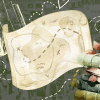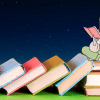We didn’t mean to stop reading

There was a time, maybe not that long ago, when the only thing you needed for a perfect evening was a book, a lamp, and maybe a warm cup of heavily sugared tea. No notifications, no pop-ups, no voice in your head asking you to just check your phone "for a second". Just you. And the words. And somehow… that was enough.
You remember, don't you?
The smell of the pages. That slightly musty, woodsy scent of old bookstores and secondhand novels. The faint crack of the spine opening for the first time. You remember the weight of a book resting on your chest as you read lying down, elbows sore, eyes barely staying open, but you HAD to finish that chapter. The dog-eared corners. The highlighter marks. The tiny scribbles you left in the margins, like you were talking back to the author.
And, the second-hand books from Nilkhet — those were special. Underlined lines in unfamiliar handwriting. Notes in the margins from someone you'll never meet!
Back then, you read before bed not because someone told you it was good for sleep hygiene… but because the story wouldn't let you go. You'd say "one more chapter" and lie to yourself with a full heart. You'd read on buses. In waiting rooms. Under the table at family gatherings. Pages became shields, doors, portals. And once you stepped in, you didn't want to come out.
And now?
Now we scroll.
Aimlessly and endlessly. Thumbs trained to flick before our eyes even register what we're looking at. We skim headlines. We like quotes from books we never actually read. We save long essays for a time that never arrives. We open tabs with good intentions and close them days later without reading a word. Somewhere in the noise… the silence of books has been drowned out. Not gone yet, just… quieter. Muted beneath the static.
The science of what stole our attention
There are reasons. Cold, clinical ones. Modern tech is engineered to keep you hooked. Every scroll, every swipe, every ding and vibration. It's all formulated to be mini dopamine hits. Our brains are tricked into thinking they're chasing something important.
A study by Microsoft found that the average human attention span has dropped from 12 seconds to just 8 seconds. That is shorter than a goldfish's. Another, from the University of California, Irvine, found that it takes 23 minutes and 15 seconds to fully regain focus after a single distraction.
Now, imagine trying to read a chapter with WhatsApp blinking at you every three minutes. It's not that you don't love books anymore. It's just that our brains are exhausted.
This isn't a tech story. This is a grief story
This isn't just about reading. This is about what we lost along with it. The slow, mindful quiet of a Friday morning, when nothing felt urgent. Remember the Fridays when all the distractions we had were pre-scheduled programs on BTV? There was joy in picking up a book at a store purely because the cover called to you. The luxury of being bored and choosing to read instead of scrolling.
We didn't just lose focus. We lost presence. We lost the version of ourselves who did not need noise to feel alive. Who could spend an entire afternoon with imaginary people and call it a good day. We lost the ability to sit with stillness… and not immediately flinch.
Let me tell you a story
A few weeks ago, I was trying to read on my laptop. The house was quiet. My 6-year-old daughter was brushing her teeth, getting ready for bed. It was one of those rare moments. No calls. No meetings. Just time. I settled in with a book on my screen I'd been meaning to finish for months. Adjusted the brightness. Scrolled to my last read chapter. Then she climbed into my lap, small, warm, drowsy.
"Can you hold me instead?" she asked.
I smiled and said, "Okay, but Baba's reading."
She looked at the glowing screen.
And then, in that soft, sleepy voice kids have when they're on the edge of dreamland, she said,
"Wouldn't it be better to read a real book?"
I didn't know what to say.
I didn't read that night. I just held her. And stared at the screen. And thought about what she said.
And how she was right.
Somewhere along the way, we stopped being readers
Fiction, our oldest escape, is now in competition with 10-second videos that fight for your attention within the first two seconds. Non-fiction used to challenge us. Now we want bullet points. Podcasts at 2x speed. We want knowledge without effort and wisdom without time. A friend's wife watches movies and videos at accelerated speed, making all characters sound like squeaky-voiced cast members from Alvin and the Chipmunks.
We treat reading like it's a luxury. A hobby for people with fewer tabs open. When really, it was always a lifeline. We didn't stop reading because we don't care. We stopped because it became hard. Because life got busy. Because we got tired. Because the world kept asking us to be faster, louder, busier. But books? They've stayed the same. Quiet. Patient. Waiting.
Maybe tonight… just maybe…
You won't finish a book. Maybe you won't even start one. But maybe you'll reach for one again.
Not as a goal. Not as a flex. Not for your "currently reading" shelf. But for that quiet place inside you that's been missing the stillness.
Because if you've made it this far… you've read nearly 1,000 words. On a glowing screen. With a thousand distractions a tap away. Maybe that's the start of something. Maybe you remember what it felt like. And maybe, just maybe, that's enough for now.

 For all latest news, follow The Daily Star's Google News channel.
For all latest news, follow The Daily Star's Google News channel. 








Comments